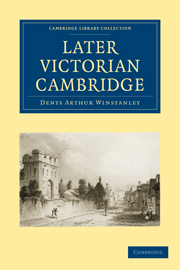Book contents
- Frontmatter
- D.A.W. A Memorial Note
- Contents
- PREFACE
- Chapter I ROBINSON'S VOTE
- Chapter II THE JUDGES AND TRINITY COLLEGE
- Chapter III THE RELIGIOUS TESTS (1862–1871)
- Chapter IV THE CAMBRIDGE UNIVERSITY AND CORPORATION ACT
- Chapter V EDUCATIONAL REFORM (1860–1880)
- Chapter VI THE TRINITY REFORMERS
- Chapter VII THE STATUTORY COMMISSIONERS AND THE UNIVERSITY
- Chapter VIII THE STATUTORY COMMISSIONERS AND THE COLLEGES
- Index
Chapter IV - THE CAMBRIDGE UNIVERSITY AND CORPORATION ACT
Published online by Cambridge University Press: 07 September 2010
- Frontmatter
- D.A.W. A Memorial Note
- Contents
- PREFACE
- Chapter I ROBINSON'S VOTE
- Chapter II THE JUDGES AND TRINITY COLLEGE
- Chapter III THE RELIGIOUS TESTS (1862–1871)
- Chapter IV THE CAMBRIDGE UNIVERSITY AND CORPORATION ACT
- Chapter V EDUCATIONAL REFORM (1860–1880)
- Chapter VI THE TRINITY REFORMERS
- Chapter VII THE STATUTORY COMMISSIONERS AND THE UNIVERSITY
- Chapter VIII THE STATUTORY COMMISSIONERS AND THE COLLEGES
- Index
Summary
In February 1852 the Royal Commissioners, appointed to inquire into the discipline, studies and revenues of the University, received a memorial from the Cambridge Borough Council, which complained of “certain privileges claimed and exercised by the University, as respects the government and trade of the town”, and alleged that the exercise of these privileges was detrimental to the welfare of the town. Called upon by the Commissioners to make answer, the University denied the existence of any substantial grievance, and asserted that the privileges in question were required for the maintenance of academic discipline. As the Commissioners were without statutory powers, they could not dictate a settlement of the dispute; but in their report to the Queen they struck a balance between the claims of the opposing, parties; and their recommendations, being likely to carry weight with the Government and Parliament, could not prudently be disregarded. Consequently in February 1853 the University agreed to enter into negotiations with the Borough Council; and for a time it seemed likely that an amicable arrangement would be reached. This hope however was disappointed, and after continuing for a year the negotiations were abruptly broken off, leaving nothing behind but a trail of bitterness. Yet though both parties were angry, they were not so angry as to wish their feud to continue; and they ultimately agreed to refer their quarrel to the arbitration of Sir John Patteson, a former Judge of the Court of King's Bench. Sir John's award, which was confirmed by Act of Parliament, gave neither side a complete victory: the privileges of the University, though restricted, were not completely abolished.
- Type
- Chapter
- Information
- Later Victorian Cambridge , pp. 91 - 143Publisher: Cambridge University PressPrint publication year: 2009First published in: 1947



